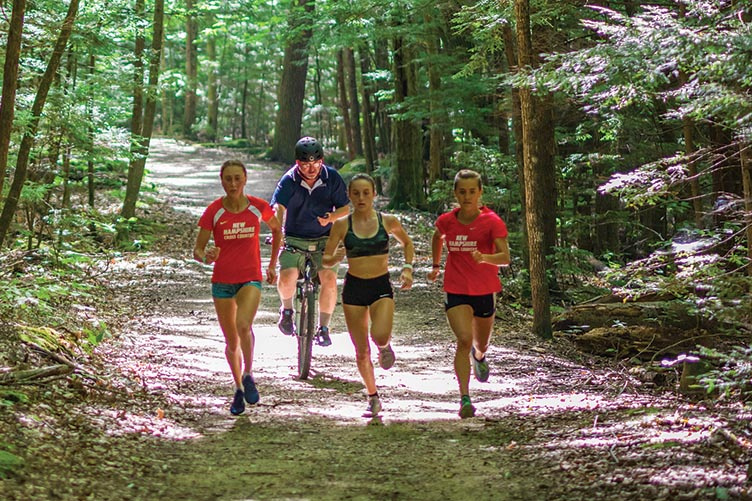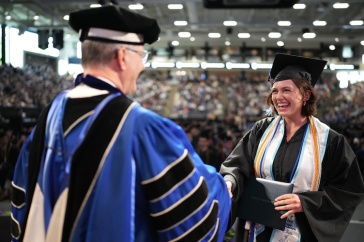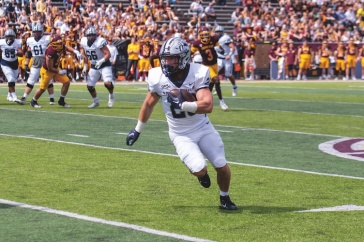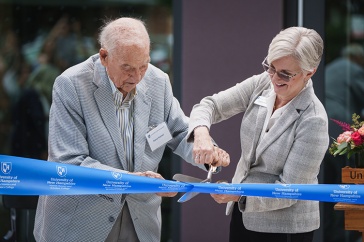
Maybe he’s gotten used to fielding questions about what it’s like to work with an elite athlete. Or maybe it just comes naturally to him, talking about the larger goal, the greater purpose. Either way, when you ask UNH’s Robert Hoppler about coaching running standout Elinor Purrier ’18, he goes back and forth between ‘she’ and ‘team’ in a cadence that makes you know it’s what he believes: the 11-time All-American was one piece of a whole.

That came in part, Hoppler says, as Purrier immersed herself with her teammates, two of whom were similarly swiftfooted: Anne Twombly ’15, a 2015 All-American, and Laura Rose Donegan ’17, a three-time All-American.
“Having them all on campus at the same time was amazing. Elle spent time with them and it became more of a group effort,” Hoppler says. “Early in her career, it was good to have that balance, so it wasn’t just about her.”
Now in his 18th season as head coach of the women’s cross-country team, Hoppler says that he knew Purrier was talented when he recruited her, but he had no idea how good she would end up being. “Initially it was about her developing as an athlete,” he recalls. “That happened very quickly.”
"The main focus is on graduating empowered, strong, motivated young women."
Purrier qualified for the finals in the women's indoor mile at the NCAA championships four times before finally winning earlier this year. She was a freshman the first time she made the cut.
“She was on the line with some of the best runners in the world,” Hoppler says. “At that point, she didn’t have a lot of training. Watching her at the meet, I was thinking, ‘This kid is special. She has talent.’ After that it became an expansion of that talent.’’
"There’s a lot more to it than just lacing them up, putting them on the line and saying, ‘Okay, go for it.’”
While Hoppler says he spent many additional hours with Purrier, his coaching basics were the same as those employed with all his athletes regarding confidence, self-awareness, staying healthy and learning from disappointments. The last of these was a skill Purrier honed after making it to the NCAA championships 10 times (a combination of indoor and outdoor track events and cross-country) without coming away with a victory.
“Initially she was just happy to be there, but probably after the fourth or fifth time she didn’t win, it got a little disappointing,” Hoppler says. “That became a challenge: learning from disappointment so she could improve the next time. I give her a lot credit for not getting discouraged.”

Hoppler also worked with the Vermont native on crafting a program, discussing tactics and creating a race plan. “In sports psychology, that’s something you’re working on all the time,” Hoppler says. “We had lots of discussions about her success, her failings, how to improve. There’s a lot more to it than just lacing them up, putting them on the line and saying, ‘Okay, go for it.’”
Coaching Purrier didn’t take his time away from the other runners, Hoppler says, because her schedule typically ramped up during the post-season championship period, after the majority of the team’s season ended. What’s more, he adds, she inspired her teammates, and they inspired her.
“These kids go out and run 50, 60 miles a week, 50 weeks a year. In snow, heat — they’re running. That creates a special attachment,” Hoppler says. “They become incredibly close. You can use that as way to build a team and make people stronger.
“The main focus is on graduating empowered, strong, motivated young women. We spend a lot of time on that,” Hoppler adds. “That’s what I’m most proud of. The byproduct is, they run well. If I had changed my approach with Elle, knowing she’d be gone in five years — what would I do now?”
-
Written By:
Jody Record ’95 | Communications and Public Affairs | jody.record@unh.edu
















































